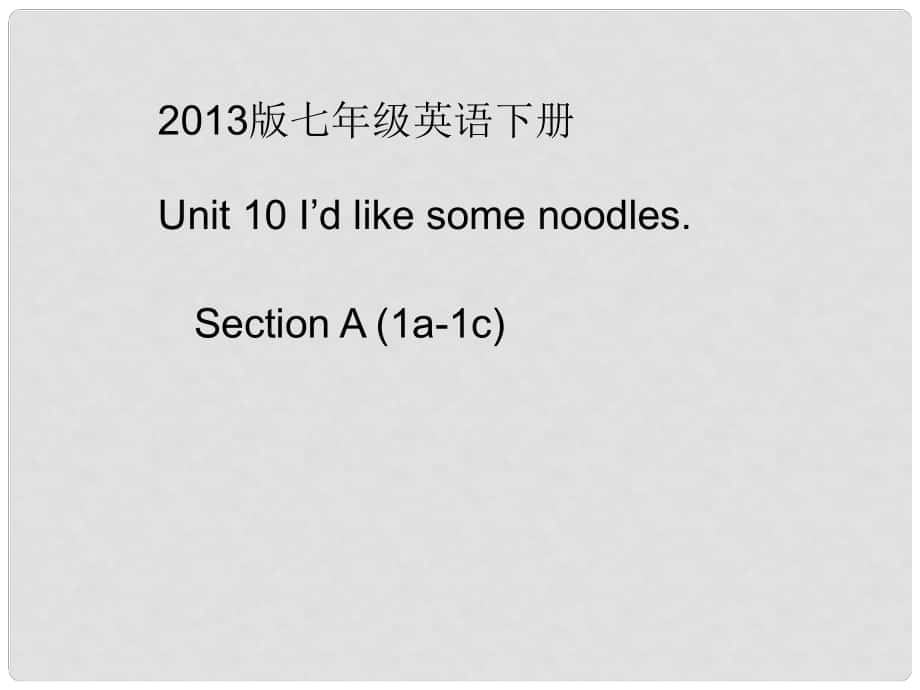《七年級(jí)英語(yǔ)下冊(cè) Unit 10 I'd some noodles Section A (1a1c)課件 (新版)人教新目標(biāo)版》由會(huì)員分享�����,可在線(xiàn)閱讀�����,更多相關(guān)《七年級(jí)英語(yǔ)下冊(cè) Unit 10 I'd some noodles Section A (1a1c)課件 (新版)人教新目標(biāo)版(28頁(yè)珍藏版)》請(qǐng)?jiān)谘b配圖網(wǎng)上搜索�����。
1�、2013版七年級(jí)英語(yǔ)下冊(cè)Unit 10 Id like some noodles.Section A (1a-1c)Id like= I would like意為意為: 想要想要, 愿意愿意與動(dòng)詞與動(dòng)詞want同義同義, 但語(yǔ)氣上比但語(yǔ)氣上比 want 更委婉更委婉, 更禮貌。更禮貌���。Id like some noodles.noodlenoodlesId like noodles.Hed like noodles.Shed like noodles.mutton羊肉羊肉beef 牛肉牛肉cabbage 卷心菜卷心菜potato 土豆tomatoespotatoesWhat kind of v
2�、egetables would you like?onionscarrotsbeef 牛肉牛肉mutton羊肉羊肉chicken 雞肉雞肉What kind of meat would you like?some和和any 既可以修飾可數(shù)名詞又可以修既可以修飾可數(shù)名詞又可以修飾不可數(shù)名詞飾不可數(shù)名詞, some常用在肯定句中常用在肯定句中, 而而any則常用在否定和疑問(wèn)句中。所以則常用在否定和疑問(wèn)句中���。所以, some 和和 any 的區(qū)別在于的區(qū)別在于: some和和any 的用法主要的用法主要是考慮用在肯定句���、疑問(wèn)句還是否定句中是考慮用在肯定句、疑問(wèn)句還是否定句中, 與名詞的可數(shù)與否無(wú)關(guān)與
3���、名詞的可數(shù)與否無(wú)關(guān)。 some和和any的用法的用法1some的用法的用法: some意為意為“一些一些”����,可作形,可作形容詞和代詞�����。它常修飾可數(shù)名詞復(fù)數(shù)�。容詞和代詞。它常修飾可數(shù)名詞復(fù)數(shù)�����。如:如:some books 一些書(shū),一些書(shū)����, some boys 一些男孩,一些男孩�, 也可修飾不可數(shù)名詞也可修飾不可數(shù)名詞: some water 一些水,一些水�,some tea 一些茶葉,一些茶葉�,2some 常用在常用在肯定句中?����?隙ň渲?�。any的用法的用法: any意為意為“任何一些任何一些”���,它也��,它也可修飾可數(shù)名詞復(fù)數(shù)或不可數(shù)名詞�,?����?尚揎椏蓴?shù)名詞復(fù)數(shù)或不可數(shù)名詞,常用于疑問(wèn)句和否定句���。用于
4��、疑問(wèn)句和否定句��。如:如: I cant see any tea. 我沒(méi)看見(jiàn)茶葉�����。我沒(méi)看見(jiàn)茶葉��。 Do you have any friends at school? 你在學(xué)校有些朋友嗎你在學(xué)校有些朋友嗎? 3但在表示建議,反問(wèn)�����,請(qǐng)求的疑問(wèn)句中�,或但在表示建議,反問(wèn)���,請(qǐng)求的疑問(wèn)句中��,或期望得到肯定回答時(shí)�,多用期望得到肯定回答時(shí),多用some而不用而不用any�����。如:如:Would you like some coffee? 你要不要來(lái)點(diǎn)咖啡你要不要來(lái)點(diǎn)咖啡? How about some fruit juice? 來(lái)點(diǎn)水果汁如何來(lái)點(diǎn)水果汁如何? 41. mutton _2. beef _ 3. n
5��、oodles _4. chicken _5. cabbage _ 6. potatoes _7. tomatoes _8. carrots _cagdefb1a. Match the words with the foods. hWhat kind of noodles are they?Noodle housespecialsId like beef and tomato noodles. Id like chicken and cabbage noodles. Id like mutton and potato noodles. Id like pork and cabbage noodl
6���、es.Id like egg and tomato noodles. _ Special 1 _ Special 2 _ Special 31b. Listen and check the noodles that the person orders. A: what would you like?B: Im not sure yet. Are there any vegetables in the beef noodles.A: Yes, there are some tomatoes.B: OK. Id like the beef noodles, please.1c. Pairwork.
7�����、 可數(shù)名詞和不可數(shù)名詞可數(shù)名詞和不可數(shù)名詞可數(shù)名詞可數(shù)名詞: 可以計(jì)數(shù)的名詞稱(chēng)為可數(shù)名詞�����?���?梢杂?jì)數(shù)的名詞稱(chēng)為可數(shù)名詞���。 一般有一般有單數(shù)與復(fù)數(shù)兩種形式單數(shù)與復(fù)數(shù)兩種形式, 前面可加前面可加a, an或數(shù)詞來(lái)修飾或數(shù)詞來(lái)修飾.不可數(shù)名詞不可數(shù)名詞: 不可計(jì)數(shù)的名詞稱(chēng)為不可數(shù)名詞����。不可計(jì)數(shù)的名詞稱(chēng)為不可數(shù)名詞。沒(méi)有復(fù)數(shù)形式?jīng)]有復(fù)數(shù)形式, 前面不能用不定冠詞前面不能用不定冠詞a, an, 也不能也不能直接加數(shù)詞直接加數(shù)詞, 但可以跟某些量詞短語(yǔ)搭配但可以跟某些量詞短語(yǔ)搭配,表示數(shù)量��。如表示數(shù)量�����。如: a glass of water, two cups of tea.Countable nounsUncountable nounspotatoestomatoesonionsstrawberriesappleseggsorangesbeefmuttonchickenriceporridgeorange juicegreen tea1. _ potato 2. _ beef 3. _ milk 4. _ strawberry 5. _ chicken 6. _ egg7. _ mutton 8. _ apple 9. _ tomato 10. _ noodles 用用 a, an或或 some填空�。填空。 asomesomeasomeansomeanasome
 七年級(jí)英語(yǔ)下冊(cè) Unit 10 I'd some noodles Section A (1a1c)課件 (新版)人教新目標(biāo)版
七年級(jí)英語(yǔ)下冊(cè) Unit 10 I'd some noodles Section A (1a1c)課件 (新版)人教新目標(biāo)版

